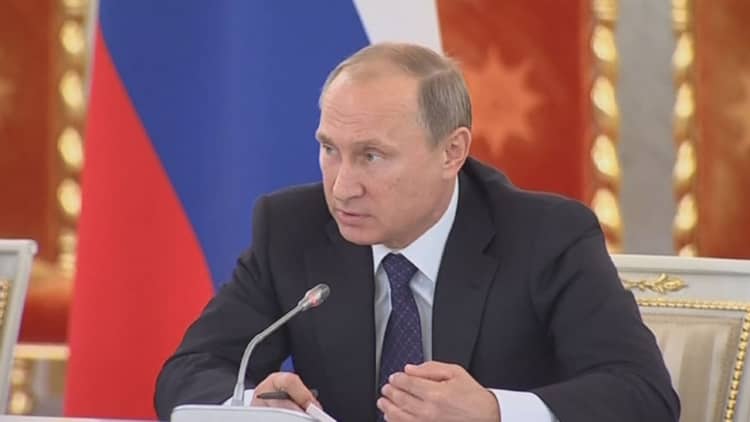Donald Trump thinks that Vladimir Putin is a "strong" leader, but that strength hasn't done much good for Russia's economy.
"The man has very strong control over a country," Trump said Wednesday of Putin, adding that the Russian president has "been a leader, far more than our president has been a leader." Trump's running mate, Mike Pence, said on Thursday that it's "inarguable" that Putin is a "stronger leader in his country than Barack Obama has been in this country."
While the United States and Europe continue to eke out a steady economic recovery, very little is going right for Russia. Gross domestic product in Russia cratered from $2.23 trillion in 2013 to $1.33 trillion last year — a staggering 40-percent drop, according to figures from the World Bank.
To put that in perspective, U.S. GDP shrank at the onset of the Great Recession from $14.719 trillion in 2008 to $14.419 trillion in 2009 — a decline of 2 percent.
Russian economic output is expected to contract by another 1.8 percent in 2016, while the poverty rate is seen rising from 13.4 percent to 14.2 percent over that period, the World Bank says.
Russia has been crushed by Western sanctions and the global plunge in oil prices. The sanctions were brought down on Russia by President Obama and America's European allies following Russia's annexation of Crimea, in 2014. And Russia is essentially what political scientists call a "petrostate" — dependent, like Venezuela and Saudi Arabia, on oil exports in order to remain solvent. As long as commodities lag, so does the Russian economy.

But Putin bears culpability for both of those major drags on the Russian economy. He has failed to diversify Russia away from oil and gas production despite personally commanding the country's economy for 16 years. And the West slapped Russia with sanctions after he ordered his military into Ukraine.
CNBC was unable to reach officials at the Russian embassy in Washington for comment on Friday.
Additionally, the people who were already living in Crimea became the responsibility of the Russian government, particularly in the sense of delivering pensions, after Russia claimed the territory.
The Russian government "has largely let the people simply figure out their new harsh reality," Stratfor's Senior Eurasia Analyst Lauren Goodrich told CNBC on Friday.
The Kremlin has worked hard to curb inflation with parliamentary elections scheduled in a couple weeks, and it is "handing out a one-time mass payout for pensions," Goodrich said.
But Matthew Rojansky, director of the Kennan Institute at the Wilson Center, told CNBC that despite promises by the Russian government to raise pensions, the bigger picture when it comes to the economy involves the Russian system of government in general, where nothing is guaranteed, despite what may be said.
"There simply is no functioning legislative branch check on executive power, so these promises are made, but there's no enforcement mechanism either way," Rojansky said. "Rather than being an intentional choice, I think the disappointing outcome in Crimea is an unintended consequence of this haphazard approach to spending and long term planning."
Edward Mermelstein, a New York attorney who advises wealthy individuals in Russia and the former Soviet Union, told CNBC that "there is no business in Russia."
"I continue to experience an interest in incoming investments and relocation of entire families into the United States," he said.
Average monthly wage: $450
Trump this week defended Putin by pointing to the Russian leader's high domestic approval ratings. And Goodrich pointed to some positive developments in the Russian economy, such as signs of foreign investment starting to return to Russia. The country's Central Bank now describes the economy as stable, mainly citing a drop in inflation and the ruble regaining some strength after tremendous volatility in the currency since early 2015.
"However, these positive signs are not enough to cover how hard the Russian people have been economically hit. Over the past year, the average Russian's monthly wage fell 9.5 percent, slipping below $450 dollars — less than in China, Serbia and Romania," Goodrich said. "According to state statistics, 50 percent of that income goes toward food, a figure on par with many African countries."
Marlen Kruzhkov, a Ukrainian-American attorney whose business is oriented toward people in the former Soviet Union who want to invest in the United States, told CNBC that business continues "to be terrible for my Russian clients and friends."
"There is little doubt amongst people that while the sanctions are not the main driving force behind the weak economy (that would be low oil prices and low worldwide demand for commodities), they are definitely acting as an accelerator for the downhill slide of the economy," Kruzhkov said.
Goodrich also highlighted the fact that the 2016 government budget has not yet been finalized, with only three months left in the year. At least part of the reason lies with Putin's refusal to cut military spending as Russia continues to undertake military operations in Ukraine, Syria and elsewhere.
"And at this time," Goodrich said, "the government looks to be about $36 billion short if it wants to keep the budget deficit under 3 percent — the first deficit under a Putin administration."


